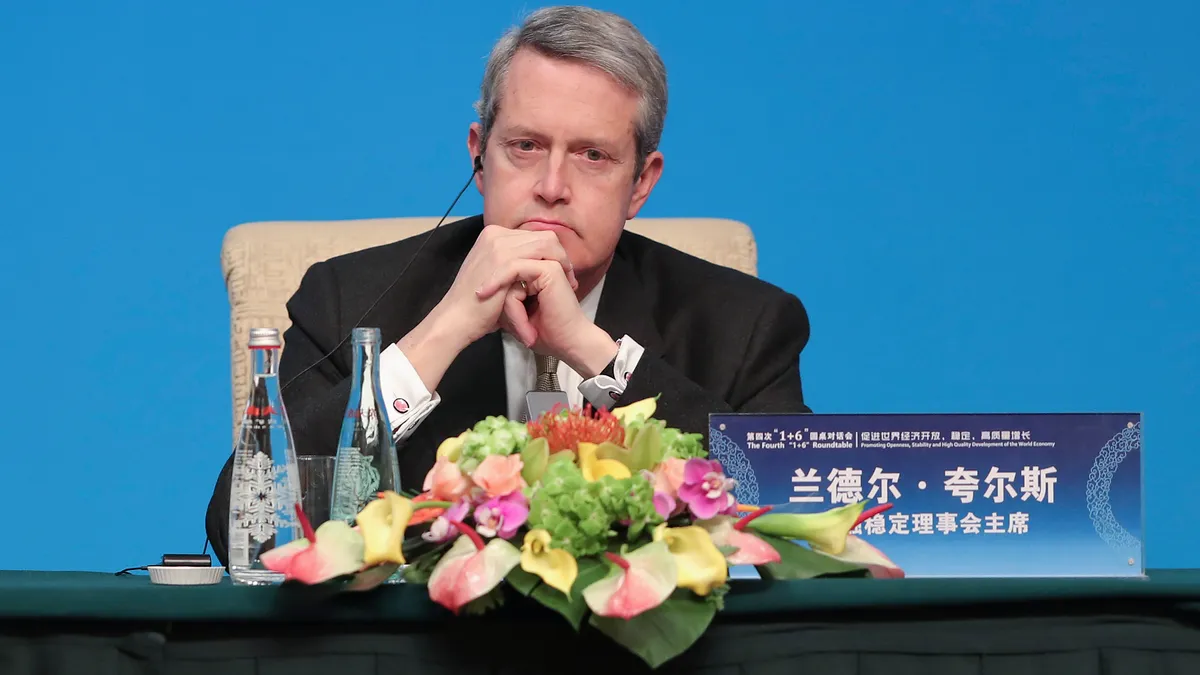Federal Reserve Gov. Randal Quarles resigned Monday in a move that allows President Joe Biden to give the central bank a Democratic majority.
Quarles’ seat is the third Fed post Biden could fill in the coming months. One seat on the seven-member board is vacant. A second, held by Fed Vice Chair Richard Clarida, is set to be open in January, when Clarida’s term expires. Provided Biden fills the Quarles, Clarida and empty seats with Democrats, that would give the central bank's board a 4-3 liberal tilt, when sitting Fed Gov. Lael Brainard is taken into account.
Quarles’ resignation takes effect "during or around the last week of December," he wrote Monday in a letter to Biden. That coincides with the end of Quarles’ term as head of the Financial Stability Board. Quarles until last month served as the Fed’s inaugural vice chair for supervision. The central bank’s Committee on Supervision and Regulation chose to proceed without a designated chair once Quarles’ term in that role ended Oct. 13. Once Quarles leaves the Fed, the panel’s two remaining members — Brainard and Fed Gov. Michelle Bowman — will work together to make decisions on bank supervision.
Quarles could have continued serving on the Fed board through 2032 — and Republican friends reportedly asked Quarles to stay on into 2022 — but central bank officials often step down if they are not reappointed to their leadership roles.
"It has been a great privilege to work with my colleagues on the Board, throughout the Federal Reserve System, and among the global central banking and regulatory community," Quarles wrote Monday in his brief resignation letter, citing the end of his vice chair term as his reasoning for leaving.
The Fed board’s composition could face a further shake-up depending on Biden’s decision regarding the top role at the central bank. Republican Fed Chair Jerome Powell’s term expires in February, and Biden has said he would decide in the fall whether to renominate Powell — a prospect that has garnered a mixed response. Treasury Secretary Janet Yellen told senior White House advisers in August that she supports reappointing Powell, according to Bloomberg. But Sen. Elizabeth Warren, D-MA, for one, has gone on record saying she would not.
Biden last week said he would make an announcement regarding Fed leadership "fairly quickly" — a notion backed up by sightings of both Powell and Brainard, who is considered the other candidate to lead the Fed, leaving the White House on Thursday.
In his time as vice chair of supervision, Quarles simplified banks’ stress tests, ushered in revisions to the Volcker Rule curbing speculative bank investments, and eased capital, leverage and liquidity rules for all but the biggest lenders.
Those moves won him little popularity among progressive lawmakers.
"Our financial system will be safer when you are gone," Warren told Quarles during a May hearing, urging Biden "to fill [Quarles’] role with someone who will actually keep our financial system safe."
During the hearing, Warren had taken Quarles to task for removing Credit Suisse and other foreign banks in November 2020 from the purview of the Fed’s Large Institution Supervision Coordinating Committee. The Swiss lender later took $5.5 billion in losses in the collapse of investment firm Archegos Capital Management.
"I thought we could make the regulatory system a lot more efficient and still have it be resilient to shocks," Quarles told The Wall Street Journal on Monday in defending his record. "The COVID event demonstrated that what we had done in that regulatory program had made it more efficient, but obviously had not undermined its safety and soundness."














